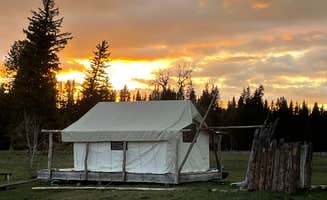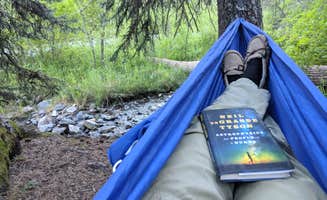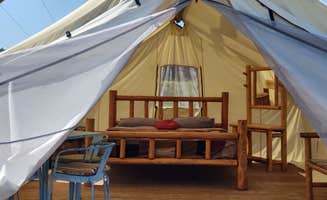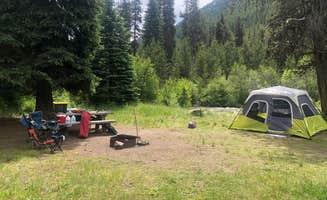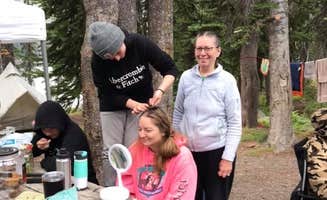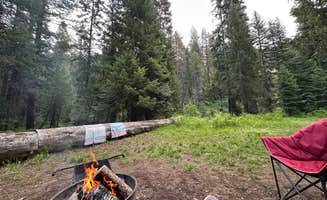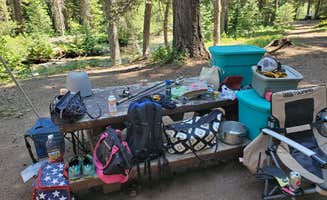Dispersed camping near Joseph, Oregon provides access to the Eagle Cap Wilderness with elevations ranging from 4,000 to 9,800 feet. The area receives significant snowfall during winter months, with some backcountry sites remaining snow-covered until July. Most Forest Service roads leading to primitive camping areas open in late May, though conditions can vary drastically based on seasonal precipitation.
What to do
Alpine hiking access: Ice Lake trail provides a challenging 9-mile hike into the backcountry with dispersed camping at approximately 8,000 feet elevation. One camper noted, "The water is no-joke cold. Fantastic nine-mile hike into the forest. Stayed two nights. Elevation is ~8,000 feet. Got altitude sickness on day two," highlighting the need to acclimate properly at Ice Lake.
Wildlife viewing: Early mornings offer opportunities to see deer throughout the camping areas. At Hurricane Creek, one visitor reported, "Saw two bucks together early in the morning grazing," while camping in site 9, which offers river access but limited shade.
Winter activities: Some campgrounds maintain limited winter access. At Wallowa Lake State Park Campground, a visitor arriving in November found "it was cold, snowy, and practically empty. But the campground and all of its facilities were open, and the camp host was extremely friendly and helpful!"
River dipping: Most campsites near creeks offer shallow water access, though water remains cold even in late summer. A camper at Hurricane Creek described a specific spot: "The river is shallow in most places but right off this site it has a deep area where you can dip, the water is freezing even in late August, and there's a 3 foot jump down onto the bank."
What campers like
Creek sounds: Many campsites position visitors close to moving water, creating natural white noise. At Hurricane Creek Campground, a reviewer mentioned, "We planned to stay three nights here but after two nights of amazing lightning storms, we skipped the third night. Still, this is a beautiful place, very private, secluded, and shady. The fast-moving creek creates a soothing white noise that we found calming."
Site privacy: Forest campgrounds typically offer more seclusion between sites than developed parks. At Williamson Campground, visitors praise the "quiet sites on the river" and note there's "space for 1 tent easily...maybe a 2nd in some. Good trees for hammock."
Off-season solitude: Visiting during shoulder seasons provides less crowded experiences. A September visitor to Irondyke Forest Camp observed, "Most campsites between the town of Lostine and Irondyke campground were taken by 7pm on Friday," suggesting early arrival is important during busy periods.
Wildlife encounters: Multiple campgrounds report regular deer sightings. A reviewer at Wallowa Lake State Park noted it's "bear country so if thats not your thing, i wouldnt camp there," indicating the natural wildlife presence throughout the region.
What you should know
Weather variability: Mountain conditions can change rapidly with storms possible even in summer. A visitor at Hurricane Creek reported, "We scheduled three nights here but after two nights of amazing lightning storms, we skipped the third night," showing the need for flexible plans.
Early reservations: For developed campgrounds during peak season, bookings fill months in advance. A Wallowa Lake State Park camper noted, "Our site was listed as close to the other sites but was the only site we could get since the sites book up months in advance."
Limited facilities: Most forest camps have vault toilets but no running water. At Williamson Campground, visitors found a "pit toilet was as clean as can be expected. Nice little river near the campsites for gathering water or cooling off," confirming the need to bring your own water or treatment methods.
Road conditions: Some forest service roads require careful driving. A Hurricane Creek camper reported they "came in a little Prius & had no issue getting to the perfect campsite," though conditions vary seasonally.
Tips for camping with families
Safety around water: Fast-moving creeks require supervision of children and pets. A visitor to Hurricane Creek cautioned, "My one caution would be that if you have dogs keep them on a leash because if they were to get in the creek that would be all she wrote. That creek is appropriately named as it really moves."
Entertainment options: Park At The River offers proximity to family-friendly activities. A reviewer mentioned, "The area is a great little getaway with a myriad of activities to do. Besides the lake there is a (pretty expensive) tram that takes you up the mountain, go carts, miniature golf, discovery centers, museums, etc."
Tent space considerations: Forest campgrounds typically accommodate 1-2 small tents per site. A visitor to Hurricane Creek noted sites "are not especially big, just enough space for two small tents," making them better suited for smaller family groups.
Season selection: For families with school-age children, sites fill quickly during summer. A Wallowa Lake State Park visitor suggested "fall brings cooler temperatures and changing colors," making September an option for families with flexible schedules.
Tips from RVers
Site selection for noise: When camping near water, consider sound levels. An RV camper at Park At The River reported, "The dry camping spots by the river are great until the neighbors run a generator all day long," suggesting requesting spots away from high-traffic areas.
Dumping station limitations: Some facilities have capacity issues. At Scenic Meadows RV Park, an RVer praised, "The most outstanding thing about this RV site is the bathroom!!!! WOW what a beautiful bathhouse! Super Duper Duper Clean!!!! You could eat off those floors," showing the value of clean facilities.
Big rig accessibility: Some campgrounds have turning radius limitations. A visitor to Scenic Meadows noted, "Really big rigs could have a problem with the turns," suggesting advance research for larger vehicles.
Seasonal utility shutoffs: Winter preparations affect late-season camping. A fall visitor to Wallowa Lake State Park found "they had water hookups shut off for winter (after we made our reservation, but before we arrived). So we had to venture back out to the designated water fill campsite our first morning."


